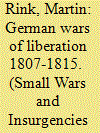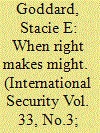|
|
|
Sort Order |
|
|
|
Items / Page
|
|
|
|
|
|
|
| Srl | Item |
| 1 |
ID:
133516


|
|
|
|
|
| Publication |
2014.
|
| Summary/Abstract |
In the Age of Napoleon, 'small wars' and 'revolutionary war' were closely connected. There were, however, different strands of this phenomenon: speaking professionally, conservative officers condemned small wars as an irregular regression to previous less disciplined forms of warfare. The Prussian state continually tried to discipline and regulate spontaneous risings. Yet the irregular character of small wars offered the opportunities for a less complex way of fighting, thus enabling the arming of the 'people' to fight. Individual undertakings, such as Ferdinand von Schill's doomed campaign in 1809, were designed to spark off a general popular uprising. But they were cheered by many and supported by few. Meanwhile, Neidhardt von Gneisenau conceived guerrilla-style Landsturm home-defence forces, which were designed for an irregular people's war. These concepts were put into practice in the 'war of freedom' - or 'war of liberation' - in 1813. Eventually both the mobilisation and the tactics remained regular, however, despite the emphatic appeal to a national 'people's war'.
|
|
|
|
|
|
|
|
|
|
|
|
|
|
|
|
| 2 |
ID:
085684


|
|
|
|
|
| Publication |
2009.
|
| Summary/Abstract |
From 1864 to 1871, Prussia mounted a series of wars that fundamentally altered the balance of power in Europe. Yet no coalition emerged to check Prussia's rise. Rather than balance against Prussian expansion, the great powers sat on the sidelines and allowed the transformation of European politics. Traditionally, scholars have emphasized structural variables, such as mulitpolarity, or domestic politics as the cause of this "underbalancing." It was Prussia's legitimation strategies, however-the way Prussia justified its expansion-that undermined a potential balancing coalition. As Prussia expanded, it appealed to shared rules and norms, strategically choosing rhetoric that would resonate with each of the great powers. These legitimation strategies undermined balancing coalitions through three mechanisms: by signaling constraint, laying rhetorical traps (i.e., framing territorial expansion in a way that deprived others states grounds on which to resist), and increasing ontological security (i.e., demonstrating its need to secure its identity in international politics), Prussia effectively expanded without opposition. An analysis of Prussia's expansion in 1864 demonstrates how legitimation strategies prevented the creation of a balancing coalition.
|
|
|
|
|
|
|
|
|
|
|
|
|
|
|
|
|
|
|
|
|